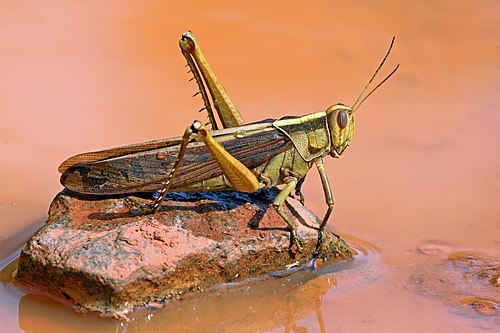Locusts are a collection of certain species of short-horned grasshoppers in the family Acrididae that have a swarming phase. These insects are usually solitary, but under certain circumstances they become more abundant and change their behaviour and habits, becoming gregarious. No taxonomic distinction is made between locust and grasshopper species; the basis for the definition is whether a species forms swarms under intermittently suitable conditions. These grasshoppers are innocuous, their numbers are low, and they do not pose a major economic threat to agriculture. However, under suitable conditions of drought followed by rapid vegetation growth, serotonin in their brains triggers a dramatic set of changes: they start to breed abundantly, becoming gregarious and nomadic (loosely described as migratory) when their populations become dense enough. They form bands of wingless nymphs which later become swarms of winged adults. Both the bands and the swarms move around and rapidly strip fields and cause damage to crops. The adults are powerful fliers; they can travel great distances, consuming most of the green vegetation wherever the swarm settles.
This picture shows an adult garden locust (Acanthacris ruficornis), a species distributed throughout Africa and parts of the Arabian Peninsula, as well as southern Spain; this individual was photographed in Ghana.Photograph credit: Charles J. Sharp
